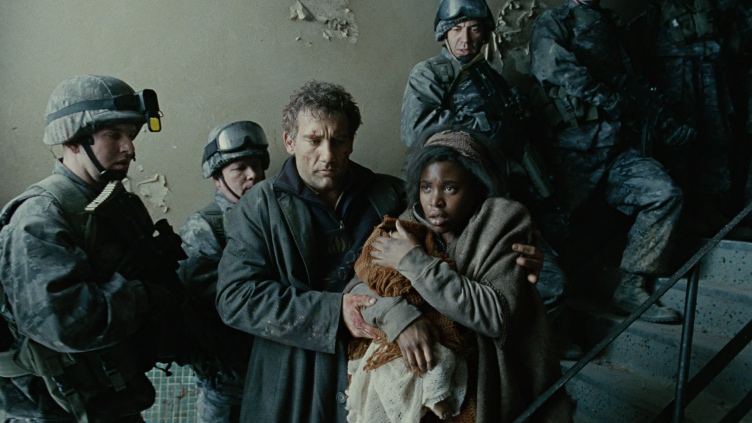I Am Alive: Alfonso Cuarón's Children of Men (2006)
In 2006, Alfonso Cuarón chased the successful, acclaimed release of Harry Potter and the Prisoner of Azkaban with Children of Men. In that era, the film was a cautionary tale of a chilling, apocalyptic world full of deadly nationalism and horrific brutality. To the younger version of myself, it was a film I could barely stand, mostly because its futility and darkness felt so implausible and bizarre.
In 2018, it feels like watching the news.
Now, of course, there are some still far-fetched elements to the story that damage that feeling of realism. After all, the film is about a near-future society where no woman is able to have children, and though it may often feel like this world deserves a karmic retribution at that level, that’s a huge element of separation. This world is built from the ground up in such a believable way by Cuarón’s direction and the excellent adapted screenplay. Through the eyes of Theo, we see the daily destruction that’s a part of life in this world. In an independent Britain that’s closed its borders in every imaginable way, violence of every kind is an inescapable part of life.
In this grim future, every vehicle in downtown London releases incredibly nasty emissions into the atmosphere, mass killings are totally commonplace, the government tortures reporters for telling the truth, the government and insurance companies would rather distribute assisted suicide medications than actually help people, and strewn all over the city are cages full of human beings crying out for mercy. The truth of our own situation echoes in these images throughout the film, though these things tend to be more hidden in reality than they are on the screen.
Yet, the global infertility doesn’t ring as the most disingenuous element in the film. That comes after the first glimmer of hope in at least seventeen years appears in the form of Kee, a refugee who’s become pregnant after working as a sex worker. As soon as she appears, Theo’s story revolves around helping her escape to those who will help her. Their journey is rife with deception and betrayal from all sides, full of people who want to use her and her child for their own purposes, whether those are political or economic or something else entirely. Every single person who seems even remotely trustworthy inevitably turns on them, and their voyage takes them to deadlier places with every step. When the baby comes, it’s born into the darkest part of this world of total devastation. The morning after the birth, the horrific refugee camp is attacked by a huge military force that forces Kee and her child into hiding, until Theo takes them out in a beautiful, stunningly long take of incredible cinematography by Emmanuel Lubezki. As the child weeps, the surrounding soldiers on both sides of the battle stop dead in their tracks and order the rest of their forces to do the same. It’s a beautiful moment of human empathy, immediate and powerful. It’s the spark that begins the relatively hopeful ending of the film, as Kee and Theo take the opportunity to get her away to safety. The ending is desperately hopeful, grasping to any chance of humanity’s survival through love and compassion.
Too bad that it just doesn’t feel real. Throughout 2018, we’ve been repeatedly shown the depths of cruelty people are capable of showing in the name of their nation. If soldiers truly did stop at the sound of a refugee child’s cries, so much of this year could have turned out so differently than the unbelievably disturbing events we see constantly. It’s incredibly difficult to hold onto the moments of joy and beauty we see in these dark times, but Children of Men is about just that. Even in the darkest times, hope is what we must hold onto. Hope must be the driving force that motivates each of us to be better, to stand up for what’s right in the face of evil.














